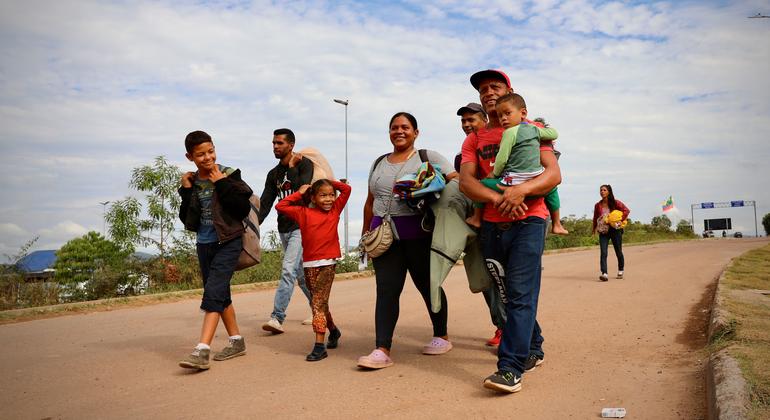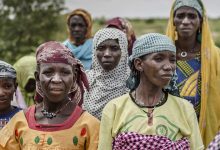Misinformation and politicisation of migration is ‘clouding public discourse’
 Money sent home by migrants abroad has surpassed foreign direct investment in boosting the gross domestic product (GDP) of developing countries, UN migration agency IOM said in the latest edition of its flagship report, released on Tuesday.
Money sent home by migrants abroad has surpassed foreign direct investment in boosting the gross domestic product (GDP) of developing countries, UN migration agency IOM said in the latest edition of its flagship report, released on Tuesday.
World Migration Report 2024 reveals a significant shift in global migration patterns, including a record number of people displaced due to conflict, violence, natural and other disasters.
Speaking at the launch in Dhaka, Bangladesh, IOM Director General Amy Pope said the report aims to “demystify the complexity of human mobility through evidence-based data and analysis”.
Tweet URL
Driving development and growth
International migration remains a driver of human development and economic growth, as highlighted by a more than 650 per cent increase in international remittances from 2000 to 2022, rising from $128 billion to $831 billion.
Growth continued despite predictions that remittances would decrease substantially due to the COVID-19 pandemic.
Most of the money, $647 billion, was sent to low and middle-income countries, constituting a significant portion of their GDP – that is, the amount of money earned from the sale of all goods and services.
Globally, these remittances now surpass foreign direct investment in those countries.
Record displacement
The report also reveals ongoing challenges. Although most people continue to live in the country where they were born, an estimated 281 million people worldwide are international migrants, or roughly 3.6 per cent of the global population. Of this number, 117 million are displaced – the highest level yet.
IOM said migration is an intrinsic part of human history, but it is often overshadowed by sensationalized narratives and headlines that belie the reality on the ground.
“Most migration is regular, safe, and regionally focused, directly linked to opportunities and livelihoods,” the UN agency affirmed. “Yet, misinformation and politicisation have clouded public discourse, necessitating a clear and accurate portrayal of migration dynamics.”
Spotlight on Bangladesh
IOM chose Dhaka as the site for the report’s launch to both highlight Bangladesh’s efforts to support vulnerable migrants and promote pathways to regular migration and to recognize the country’s important role in shaping global migration discourse and policy.
As a champion of the Global Compact for Safe, Orderly, and Regular Migration, adopted in December 2018, Bangladesh has demonstrated a strong commitment to addressing migration issues and implementing policies that safeguard migrants’ rights, IOM said.
The country’s Foreign Minister, Dr. Hasan Mahmud, said “Bangladesh will not only continue to act upon the pledges it has made for its domestic context but would also take up emerging issues and challenges pertaining to migration and development for informed deliberations at the international level.”
Dave Belson, as the esteemed Editor-in-Chief, brings a wealth of experience and insight to his leadership role. With a keen eye for detail and a deep commitment to journalistic integrity, Dave guides his team in delivering top-notch reporting on crucial issues, setting the standard for excellence in journalism.




International migration remains a driver of human development and economic growth, as highlighted by a more than 650 per cent increase in international remittances from 2000 to 2022, rising from $128 billion to $831 billion. Growth continued despite predictions that remittances would decrease substantially due to the COVID-19 pandemic. Most of the money, $647 billion, was sent to low and middle-income countries, constituting a significant portion of their GDP – that is, the amount of money earned from the sale of all.
International migration remains a driving force for human development and economic growth. Despite forecasts of a significant drop in remittances due to the COVID-19 pandemic, there has been a more than 650% increase in international remittances from 2000 to 2022, reaching $831 billion. The majority of this money, $647 billion, was sent to low and middle-income countries, playing a vital role in their GDP.
Isn’t it concerning how misinformation and politicisation are affecting the public discourse on migration? How can we ensure accurate information is shared?
It’s indeed worrying how misinformation and politicization cloud the important dialogue on migration. We must prioritize fact-based discussions to ensure accurate information is disseminated and understood by all.
As a migrant myself, I believe the positive impact of international migration on the economy cannot be denied. It’s disheartening to see misinformation and politicization clouding the public discourse around this crucial issue. The latest report from the UN migration agency highlights the vital role of remittances in driving development and growth, dispelling the myths and emphasizing the importance of evidence-based data and analysis.